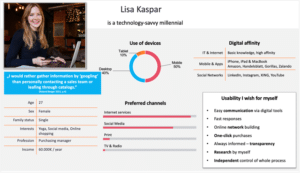The “diCE Model” of HS Fresenius and ORT
Successful sales in times of Corona and beyond
Cooperation between ORT Medienverbund and the E-Commerce Institute of HS Fresenius
Against the backdrop of the transformation of B2B sales, the E-Commerce Institute of the Fresenius University of Applied Sciences, together with the agency group for sales and marketing ORT, is developing a new type of integrated approach to provide companies with a suitable solution in the face of radically changed conditions. This solution approach includes comprehensive digital support for all customer touchpoints within the framework of the customer journey and is referred to as the “diCE Model: Digital Customer Engagement Model”. Essentially, the previous tried-and-tested forms of face-to-face communication within the framework of customer interaction are supplemented and expanded by appropriately integrated, digital modules and support approaches. In this way, a permanently relevant customer engagement is achieved that will also allow the greatest possible sales success in the future. To track current results of the collaboration, feel free to visit this page.
The latest findings
As part of the English-language master’s program in Digital Management at the Fresenius University of Applied Sciences in Cologne, Germany, two master’s theses and a three-month case study were conducted on this topic last semester. In the following, a few interesting findings of the students are presented, which clearly underline the current relevance of the topic. Please also feel free to read the already published article on one of these master theses entitled “Integrated Digital Sales Platform for the Solution of Customer Needs” (insert link).
Digital sales in B2B on the rise
Last year’s COVID-19 pandemic in particular underscored this trend. Abrupt changes accelerated digital sales in a big way. On average, digital offerings jumped forward seven years in just a few months. As a result, within the last year, there has been a strong awareness of the opportunities of digitalization among the population. Sales people have realized that digital ways of working work well and bring many benefits. In the future, companies will increasingly want to benefit from the many advantages they have experienced over the past year through digital working methods.
In the future, crucial issues for the success of B2B e-commerce, especially marketplaces (ibi research 2019, n.d.)
The generational shift is emerging
More than half of the people involved in B2B purchasing already belong to the digital native generation. This technology-savvy generation is characterized by its preference for using the Internet as well as digital communication. They have grown up with digital applications and take their presence and use for granted. This means that the digital factor is also taking center stage in sales.
Persona of a typical B2B buyer
Interests of B2B customers
People involved in purchasing have an increasing preference for digital applications. There are some stages in the buying process where digital selling is much more desirable than traditional selling. In particular, the search for information largely takes place online. In this context, customers prefer self-service to obtain information in advance and compare offers. They attach particular importance to speed, quality and transparency. Furthermore, customers attach increasing importance to being able to act independently of time and location. They prefer to be able to access information, content, customer service, or purchasing options directly. This is particularly preferred for repeat purchases, cross-selling and upselling.
Customers are increasingly obtaining information on their own (Barsch 2019, p. 2).
A digital sales platform can provide customers with an omnichannel experience
A digital sales platform is able to support the customer journey. Different touchpoints can be combined in one application and customers can find a unified sales presence of the company. This enables customers to independently access all channels, information or events from one digital application. They are able to seamlessly move from one customized touchpoint to another without changing their customer experience.
Limits of digital sales
Personal contact, face-to-face meetings, will continue to be essential for sales success. Especially in B2B, for products, systems, devices and services that require explanation, or when large amounts of money are involved, personal contact will continue to be relevant. Here, you will continue to build trust, cultivate relationships and negotiate in person.
Summary of key findings
– The COVID 19 pandemic has permanently changed lives and significantly accelerated the impact of digitalization
– Digital sales will also play a major role in the B2B sector
– A digital sales platform supports the customer journey
– A digital B2B sales platform should be customized to the individual customers in question
Sources:
Barsch, T., Status of digitalization in B2B new customer sales: development of assessment criteria and creation of a maturity model, Springer Gabler, Wiesbaden.
ibi research, 2020, Which topics do you see as crucial for the future success of B2B e-commerce, especially marketplaces? Viewed 05 July 2021, from https://de.statista.com/statistik/studie/id/67069/dokument/b2b-e-commerce-in-deutschland.

